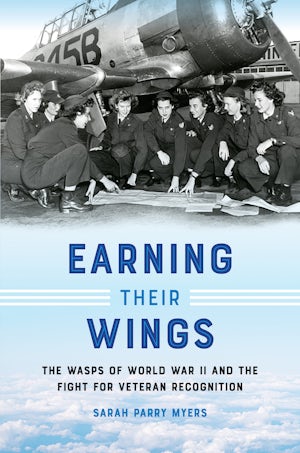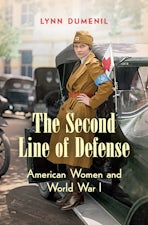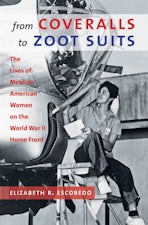Earning Their Wings
The WASPs of World War II and the Fight for Veteran Recognition
By Sarah Parry Myers
256 pp., 6.125 x 9.125, 8 halftones, notes, bibl., index
-
Paperback ISBN: 978-1-4696-7503-9
Published: September 2023 -
Hardcover ISBN: 978-1-4696-7502-2
Published: September 2023 -
E-book EPUB ISBN: 978-1-4696-7504-6
Published: September 2023
Buy this Book
- Paperback $29.95
- Hardcover $99.00
- E-Book $22.99
For Professors:
Free E-Exam Copies
Myers shows us how those in the WASP program bonded through their training, living together in barracks, sharing the dangers of risky flights, and struggling to be recognized as military personnel, and the friendships they forged lasted well after the Army Air Force dissolved the program. Despite the WASP program's short duration, its fliers formed activist networks and spent the next thirty years lobbying for recognition as veterans. Their efforts were finally recognized when President Jimmy Carter signed a bill into law granting WASP participants retroactive veteran status, entitling them to military benefits and burials.
About the Author
Sarah Parry Myers is assistant professor of history at Messiah University.
For more information about Sarah Parry Myers, visit
the
Author
Page.
Reviews
"An inspiring story of women who, though dismissed by many as mere novelties, combatted public suspicions and fears, subterfuge, and congressional resistance as they demanded an opportunity to serve in World War II and then waged an even longer war to be recognized as veterans. [This book] returns a fierce group of women pilots to their rightful place in history, at the center of vital questions about the meanings of women's wartime service."—Kara Dixon Vuic, author of The Girls Next Door: Bringing the Home Front to the Front Lines
"By introducing us to the WASPs, Myers reminds us that equating 'veteran' with 'combat' misunderstands the highly technical nature of modern US warfare. WASPs didn't just free men for combat but brought an essential skill to the US military."—Heather Marie Stur, University of Southern Mississippi
"An excellent contribution to women's history, aviation history, and military history."—Lynn Dumenil, author of The Second Line of Defense: American Women and World War I
"Myers's work illustrates that servicewomen today are the latest generation of women in the air, and their position has been strengthened by the work that WASPs undertook to achieve recognition of their roles."—Tanya L. Roth, author of Her Cold War: Women in the U.S. Military, 1945–1980




